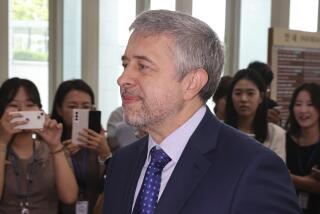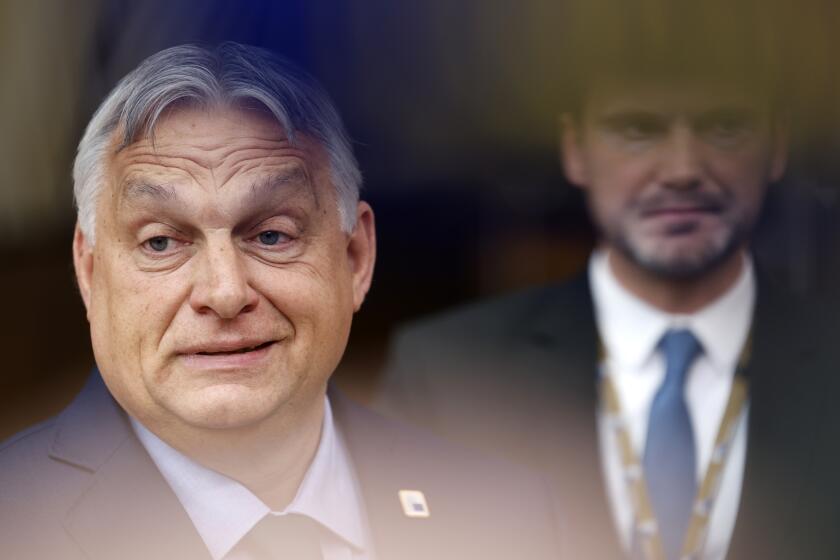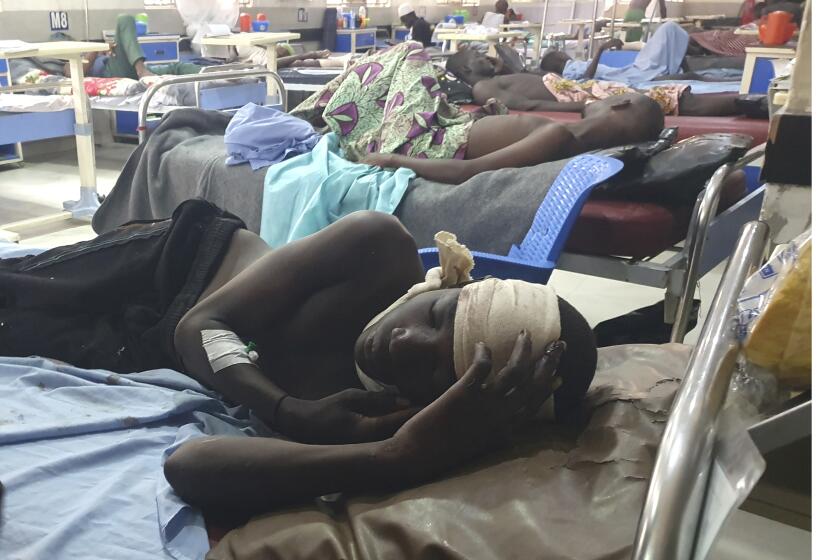Yeltsin to Seoul: Promises, Apology : Northeast Asia: Russian tells hopes for active role in the region, delivers flight recorders from downed jet.
With an apology for the past and promises of disarmament and business opportunities, Russian President Boris N. Yeltsin told South Koreans on Thursday that Russia wants to become an active player in the economies and security of Asian-Pacific nations.
The apology was for the downing of a Korean Air Lines jet with 269 people aboard, including 63 Americans, on a New York-Seoul flight in 1983. And Yeltsin handed over to President Roh Tae Woo the flight data and voice recorders from the airliner, shot down by a Soviet fighter’s missile southwest of Sakhalin Island.
On disarmament, Yeltsin said that Russia in a few years might cut in half, then halt, its production of military submarines. That statement, which came as a surprise to many officials in Moscow, was reported in Russia in a single sentence by the Itar-Tass news agency. The move reflects Russia’s mounting economic troubles, its vastly changed military and security needs and disenchantment with the submarine as a cost-effective weapon.
As for Russia’s role in Asia, specifically the Korean Peninsula, Yeltsin supported the position adopted by both South Korea and the United States, which still stations 37,000 troops here, that Communist North Korea should accept mutual North-South Korean inspections of nuclear facilities to ensure that neither country produces nuclear arms.
He proposed establishing a multinational committee to consider whether there is a need for an “international navy” to protect sea routes and suggested an Asian-Pacific “early-warning system” and research center to study military affairs in Northeast Asia. Russia, he said, would make its military secrets available to the center.
“We regard no country in Asia as hostile,” he declared, adding that “we are willing to reduce our arms to serve only a defensive role.”
On economic issues, Yeltsin said Russia wants to develop a “cooperative partnership” with the United States in Asia. Moscow wants to participate in the 12-member Asia-Pacific Economic Cooperation organization--which includes the United States, Japan, China and South Korea--and Russia is ready to join any multinational Northeast Asia development project.
He urged the South Koreans to invest in Russia and offered to sell arms and military technologies he said would be useful in developing commercial products. He pinpointed 23 economic projects for joint investment.
He also said Russia no longer opposes the reunification of the Korean Peninsula, which it divided after World War II by establishing President Kim Il Sung’s regime in the north. “Unification is now in the hands of the people of North and South Korea,” he said. “Russia certainly will not seek any political or economic gain by trying to maintain a divided Korea.”
All these moves, coming on Yeltsin’s first official trip to Asia, underscored the Russians’ desire to strengthen a two-year-old foothold in a former enemy nation and to put an Asian face on their country, which has been accustomed to looking toward Europe.
Yeltsin called both the destruction of the Korean Air Lines jet and the 1950-53 Korean War, in which Moscow supported Communist North Korea, “tragedies” that should never occur again.
He said he had intended to send the jet’s flight recorders to the International Civil Aviation Organization in Canada, but noted, “I brought them here as a show of friendship and apology.”
The gesture was designed to respond to South Korean complaints that copies of transcripts that he ordered released last month were incomplete. The jetliner’s destruction caused a blowup in U.S.-Soviet relations when Moscow sought to justify its actions by charging that the civilian airliner was on an American spy mission.
Yeltsin recalled that more than 2 million people were killed in the Korean War, which he said made Korea “the burning furnace of Cold War ideology.” To underscore Russia’s new values, Yeltsin and Roh signed a treaty pledging both nations to respect the principles of freedom, democracy, human rights and a market economy.
Roh told Yeltsin that his government will lift its freeze on loans to Russia, imposed after Moscow failed to make interest payments on an initial $1.47 billion worth of credits. Russia last weekend agreed to pay the overdue interest, mostly with shipments of aluminum ingots. South Korea had promised to extend $3 billion in loans as part of the establishment of diplomatic relations two years ago.
The two leaders also agreed to “step up efforts” to exploit Russian forests and natural gas fields at Yakutsk and on Sakhalin Island.
Yeltsin’s pledge to reduce Russian production of “Typhoons” and other submarines designed to carry ICBMs provided further evidence of the decline in strategic importance of the vessels, created, in essence, to present a permanent, hard-to-detect and mobile threat to the United States and its allies. With the Soviet Union’s collapse and the disappearance of any threat from the West, the submarines are no longer needed.
Further, as the Russian military reduces its strategic arsenal under pressure from Yeltsin, cheaper land-based ICBMs, at drastically reduced levels, may serve Moscow’s needs.
The London-based International Institute for Strategic Studies estimates that Russian armed forces have 317 submarines, 60 equipped with nuclear missiles.
But such large numbers may be deceptive; far from being the deadly high-tech behemoths profiled in the book and film “The Hunt for Red October,” Soviet-built subs have been roundly criticized for their dubious reliability and technical flaws.
Jameson reported from Seoul; Dahlburg reported from Moscow.
More to Read
Start your day right
Sign up for Essential California for news, features and recommendations from the L.A. Times and beyond in your inbox six days a week.
You may occasionally receive promotional content from the Los Angeles Times.






